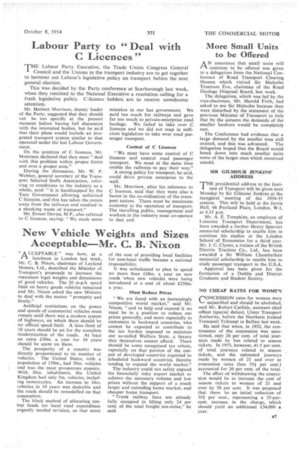New Vehicle Weights and Sizes Acceptable Mr. C. B. Nixon
Page 41

If you've noticed an error in this article please click here to report it so we can fix it.
"ACCEPTABLE " was how, at a luncheon in London last week, Mr. C. B. Nixon, chairman of Leyland Motors, Ltd., described the Minister of, Transport's proposals to increase the maximum legal weights and dimensions of good vehicles. The 20 m.p.h. speed limit on heavy goods vehicles remained and Mr. Nixon asked the new Minister to deal with the matter "promptly and firmly."
Artificial restrictions on the power and speeds of commercial vehicles must remain until there was a modern system of highways, on which there should be no official speed limit. A time limit of 10 years should be set for the complete modernization of the roads. At least an extra £50m. a year for 10 years should be spent on them.
The prosperity of a country was directly proportional to its number of vehicles. The United States, with a population of 150m., had 50m. vehicles and was the most prosperous country. With 50m. inhabitants, the United Kingdom had only 5m, vehicles, including motorcycles. An increase to 10m. vehicles in 10 years was desirable and the roads should be remodelled on that assumption.
The block method of allocating central funds for local road expenditure urgently needed revision, so that more of the cost of providing local facilities for non-local traffic became a national responsibility.
It was unbalanced to plan to spend no more than £18m. a year on new roads when new vehicles were being introduced at a cost of about £250m. a year.
Must Reduce Prices
"We are faced with an increasingly competitive world market," said Mr. Nixon, "and to help and expand it we must be in a position to reduce our prices generally, and more especially to customers in backward countries, who cannot be expected to contribute to the tax burden imposed to maintain our so-called Welfare State, a luxury they themselves cannot afford. There should be some recognized tax rebate, especially on that portion of the output of developed countries exported to scheduled backward countries, thereby tending to expand the world market."
The industry could not safely expand the financially risky export market or achieve the necessary volume and low prices without the support of a much larger and extending home market, and cheaper home transport.
"Trunk railway lines are already fully occupied in lifting only 24 per cent, of the total freight ton-miles," he said.




























































































